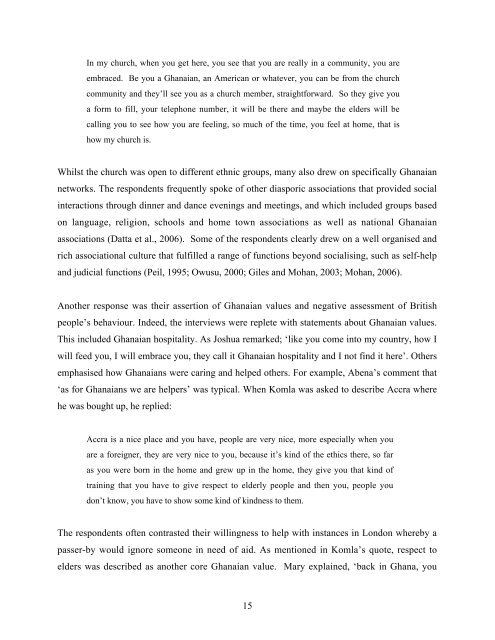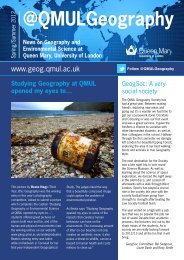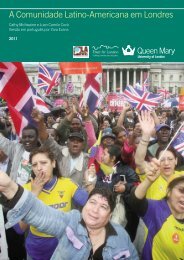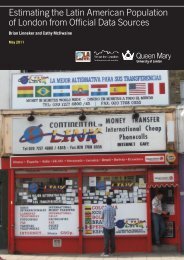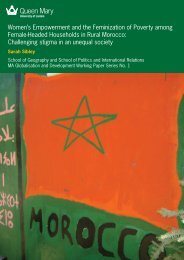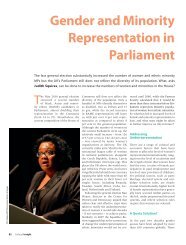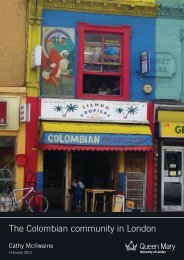Multiculturalism at work: The experiences of Ghanaians in London
Multiculturalism at work: The experiences of Ghanaians in London
Multiculturalism at work: The experiences of Ghanaians in London
- No tags were found...
You also want an ePaper? Increase the reach of your titles
YUMPU automatically turns print PDFs into web optimized ePapers that Google loves.
In my church, when you get here, you see th<strong>at</strong> you are really <strong>in</strong> a community, you areembraced. Be you a Ghanaian, an American or wh<strong>at</strong>ever, you can be from the churchcommunity and they’ll see you as a church member, straightforward. So they give youa form to fill, your telephone number, it will be there and maybe the elders will becall<strong>in</strong>g you to see how you are feel<strong>in</strong>g, so much <strong>of</strong> the time, you feel <strong>at</strong> home, th<strong>at</strong> ishow my church is.Whilst the church was open to different ethnic groups, many also drew on specifically Ghanaiannet<strong>work</strong>s. <strong>The</strong> respondents frequently spoke <strong>of</strong> other diasporic associ<strong>at</strong>ions th<strong>at</strong> provided social<strong>in</strong>teractions through d<strong>in</strong>ner and dance even<strong>in</strong>gs and meet<strong>in</strong>gs, and which <strong>in</strong>cluded groups basedon language, religion, schools and home town associ<strong>at</strong>ions as well as n<strong>at</strong>ional Ghanaianassoci<strong>at</strong>ions (D<strong>at</strong>ta et al., 2006). Some <strong>of</strong> the respondents clearly drew on a well organised andrich associ<strong>at</strong>ional culture th<strong>at</strong> fulfilled a range <strong>of</strong> functions beyond socialis<strong>in</strong>g, such as self-helpand judicial functions (Peil, 1995; Owusu, 2000; Giles and Mohan, 2003; Mohan, 2006).Another response was their assertion <strong>of</strong> Ghanaian values and neg<strong>at</strong>ive assessment <strong>of</strong> Britishpeople’s behaviour. Indeed, the <strong>in</strong>terviews were replete with st<strong>at</strong>ements about Ghanaian values.This <strong>in</strong>cluded Ghanaian hospitality. As Joshua remarked; ‘like you come <strong>in</strong>to my country, how Iwill feed you, I will embrace you, they call it Ghanaian hospitality and I not f<strong>in</strong>d it here’. Othersemphasised how <strong>Ghanaians</strong> were car<strong>in</strong>g and helped others. For example, Abena’s comment th<strong>at</strong>‘as for <strong>Ghanaians</strong> we are helpers’ was typical. When Komla was asked to describe Accra wherehe was bought up, he replied:Accra is a nice place and you have, people are very nice, more especially when youare a foreigner, they are very nice to you, because it’s k<strong>in</strong>d <strong>of</strong> the ethics there, so faras you were born <strong>in</strong> the home and grew up <strong>in</strong> the home, they give you th<strong>at</strong> k<strong>in</strong>d <strong>of</strong>tra<strong>in</strong><strong>in</strong>g th<strong>at</strong> you have to give respect to elderly people and then you, people youdon’t know, you have to show some k<strong>in</strong>d <strong>of</strong> k<strong>in</strong>dness to them.<strong>The</strong> respondents <strong>of</strong>ten contrasted their will<strong>in</strong>gness to help with <strong>in</strong>stances <strong>in</strong> <strong>London</strong> whereby apasser-by would ignore someone <strong>in</strong> need <strong>of</strong> aid. As mentioned <strong>in</strong> Komla’s quote, respect toelders was described as another core Ghanaian value. Mary expla<strong>in</strong>ed, ‘back <strong>in</strong> Ghana, you15


